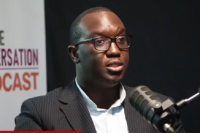Former Attorney General Musa Mwenye says people who are corrupt and incompetent in a democratic governance system, cannot be transparent and competent in a dictatorship.
Recently, Kanchibiya PF member of parliament Martin Malama told the National Assembly that holding elections was a waste of money when the party in power was already delivering what was needed for the people.
Malama said he wanted the ruling party to improve the economy and better peoples’ living conditions so that it could be in power long enough like the Communist Party of China.
But in a statement shared on his Facebook page, Monday, Mwenye said corrupt and incompetent leaders would only get worse under a dictatorship.
Mwenye also said comparing Zambia to China in terms of governance system was misplaced as China had strong leadership principles derived from Confucius teachings, which made leaders in that country responsible.
“Lately, there have been some suggestions made by some sections of our society including some parliamentarians, that we should do away with our democracy and replace it with something else. The alternative to a democracy is obviously a dictatorship. The argument is that in a democracy, we spend too much time on politics instead of development. In essence, the proponents of this point of view argue that a dictatorship should be imposed so that we should stop criticising Government to allow for development. These arguments are clearly flawed,” Mwenye stated.
“People who are corrupt, incompetent and incapable in a democracy will undoubtedly be corrupt, incapable and incompetent in a dictatorship. If a person cannot work and deliver tangible development when he or she is subjected to scrutiny by the people who voted for him or her, how will he or she deliver development when there is no scrutiny by those people who elected him or her? In fact, it is proven that corruption, incompetence and inefficiencies have always become worse in dictatorships in sub Saharan Africa as was seen in Central African Republic, Zaire (now Democratic Republic of Congo) or Uganda under Idi Amin.”
Mwenye also said comparing Zambia to China in terms of governance system was misplaced as China had strong leadership principles derived from Confucius teachings, which makes leaders responsible.
“The comparison being made between Zambia and countries like China, is completely misplaced. Some of those countries in East Asia like China, that have had strong leadership akin to dictatorship apply Confucius principles which are part of their culture and are deeply ingrained in the fabric of their society. Confucius principles concentrate on duties that leaders owe their country and what those leaders should do to better their country. Here on the other hand, our leaders seem to concentrate on the benefits they can get from being in leadership,” Mwenye said.
“It is not uncommon in China for leaders who are members of the ruling communist party to be executed for being convicted of corruption. In Singapore, even those very close to the people in power are sent to prison for corruption. That is why those countries develop even under strong or dictatorial leadership while dictatorships in this part of Africa only lead to increased poverty of the people while the rulers become shockingly rich.”
He argued that the failure by those in government to deliver development could not be blamed on democracy but on their own incompetence and corruption.
“There is no single dictatorship in this part of Africa that has lead to development and prosperity of the people. We have one or two countries in this region that have had very strong leadership and have developed, but those countries are not dictatorships per se. They hold elections and the leaders have been re-elected based on sound leadership, reduction of poverty and delivery of development to the people,” stated Mwenye.
“Zambia is a democracy, full stop. Democracy is the best form of governance system for Zambia and any suggestion of the introduction of a dictatorship is a betrayal of trust. Failure to deliver development by successive governments has been a result of either the inability, corruption or negligence of those in charge of Government and cannot be blamed on democracy. Let us work to develop this nation, through the democratic institutions of the state.”











